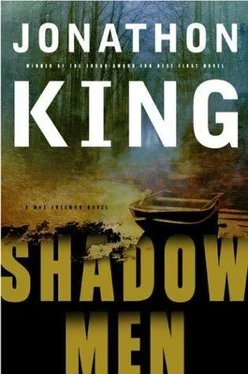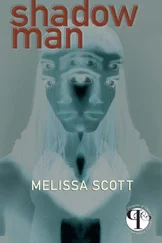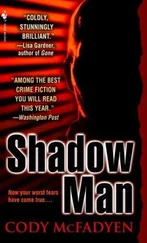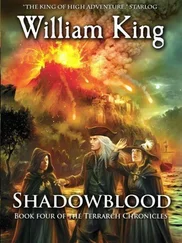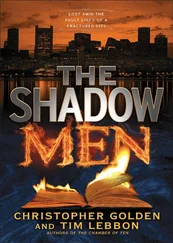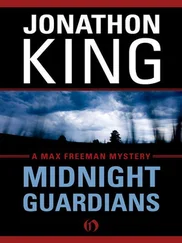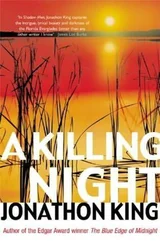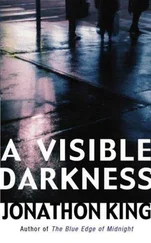Jonathon King - Shadow Men
Здесь есть возможность читать онлайн «Jonathon King - Shadow Men» весь текст электронной книги совершенно бесплатно (целиком полную версию без сокращений). В некоторых случаях можно слушать аудио, скачать через торрент в формате fb2 и присутствует краткое содержание. Жанр: Триллер, на английском языке. Описание произведения, (предисловие) а так же отзывы посетителей доступны на портале библиотеки ЛибКат.
- Название:Shadow Men
- Автор:
- Жанр:
- Год:неизвестен
- ISBN:нет данных
- Рейтинг книги:4 / 5. Голосов: 1
-
Избранное:Добавить в избранное
- Отзывы:
-
Ваша оценка:
- 80
- 1
- 2
- 3
- 4
- 5
Shadow Men: краткое содержание, описание и аннотация
Предлагаем к чтению аннотацию, описание, краткое содержание или предисловие (зависит от того, что написал сам автор книги «Shadow Men»). Если вы не нашли необходимую информацию о книге — напишите в комментариях, мы постараемся отыскать её.
Shadow Men — читать онлайн бесплатно полную книгу (весь текст) целиком
Ниже представлен текст книги, разбитый по страницам. Система сохранения места последней прочитанной страницы, позволяет с удобством читать онлайн бесплатно книгу «Shadow Men», без необходимости каждый раз заново искать на чём Вы остановились. Поставьте закладку, и сможете в любой момент перейти на страницу, на которой закончили чтение.
Интервал:
Закладка:
When the service ended I stood watching until the last folks had filed out. Jefferson was outside at the bottom of the steps, clasping each hand and giving them a personal word. There was no one behind me when he looked up into my face and took my hand. His grip was soft and I could feel delicate bones through tight skin. He waited an extra few beats as the last true parishioner stepped out of earshot. His eyes were a dark blue that I had never encountered before.
"Mr. Freeman, the investigator, I presume," he said, a professional smile on his face.
"Yes, Reverend," I said. He'd caught me off guard. "A fine cleric and a clairvoyant too?"
His laugh was less formal. "Yes, well, I knew you would be coming sometime. I suspect I've always known someone would."
An hour later we were alone at a picnic table under the oaks. Jefferson had made the rounds with his people, consoling, blessing, promising visits and agreeing to commitments later in the week. When it became awkward for him to simply keep introducing me as Mr. Freeman without elaboration, I wandered over to the open table and sat inspecting the sparse moss hanging in the oak limbs and trying to identify the birdsong coming out of a nearby field. With only a few cleanup volunteers on the grounds, the reverend had finally walked back to join me.
"You are originally from the Everglades City area. I don't have that wrong, do I, Reverend?" I said, cutting straight to it.
"That's correct."
"And your father and grandfather before him?"
"We left in 1962, Mr. Freeman. My parents moved to Naples the year my grandfather passed."
His face was calm and emotionless. I'd seen the look before, years ago, when I'd come to the home of a Germantown woman in North Philly who'd aborted her child. It had taken the squad and the M.E. several days to track her down and she'd been waiting for us when we arrived. Jefferson had the same resigned and haunted look, as though he were waiting for me to announce his arrest and cuff him.
"Reverend, I'm looking into the disappearance of three men. A father and his two sons. We have reason to believe that they may have been killed when they were at work on the Tamiami Trail in 1924."
Jefferson's eyes had closed when I mentioned the two sons, and he kept them closed.
"We came across some letters written by the missing father and he specifically mentions a marksman named Jefferson who, the letter indicates, watched over the laborers. Could that Jefferson have been your grandfather, Reverend?"
He opened his eyes and at first seemed to be focused on something far behind my left ear. I might have turned to look if I hadn't known that there was only a wide and knurled trunk of oak behind me. Then his eyes shifted back onto mine.
"If it had to do with killing and evil, Mr. Freeman, then it most likely did have my grandfather Jefferson's hand in it," he said in a flat and somewhat defeated tone.
"Sir?" I said. The bluntness of the statement had jarred me.
"You see, Mr. Freeman, John William Jefferson was an evil man. Some in that place and time may have thought of him as the devil himself."
With that the pastor crossed his arms over his chest, took a deep and brave breath and told me all he knew about his infamous relative.
John William had come to the Ten Thousand Islands sometime around 1920. He brought his wife and a sum of money that was unusual for the time. He bought a prime piece of land along the Turner River that was among the most elevated of the shell mounds in the area. It was consequently valuable since it had the potential to be farmed. But John William was not a farmer. He was a slight man, with delicate hands that his grandson would inherit, and he always wore a wide-brimmed hat that put his eyes in constant shade. The first rumor about him was that he was dumb and could not speak a word because it was so rare than anyone other than his wife ever heard his voice. Ted Smallwood down at his post office and store at Chokoloskee would eventually dispel that rumor. In his few dealings with John William, Smallwood knew that not only could the man speak, but he could also read and write and was highly proficient and meticulous in documenting his finances.
The second rumor was that the new arrival was, in fact, a criminal, a killer who had fled the law in Missouri and come to the virgin outpost of southwest Florida to hide. Unlike the other rumor, this one never died, and was in fact built upon throughout John William's life. Stories of his exploits held few if any provable facts. The only truly witnessed detail of the man was his prowess with a rifle. That ability was known by his family and those in the sparse and isolated community. But the speculation about that ability colored everything else he was.
He was not a lazy man, though his industry was the focus of many wagging tongues. On his river land he built one of the finest houses in the area, along with a stone cistern to gather fresh water and a solid barn that was considered ostentatious by his neighbors. But though his land was envied for its precious inches of rich topsoil, and his location next to the river for its easy access to the bay, John William did not farm or fish for profit. He was a hunter, and as the Reverend Jefferson's mother often said in her late night stories to him, he answered to no God or man other than himself.
John William made his living killing things. In the early years, when the fashion for ladies' hats in New York and the rest of the Northeast turned to outrageous displays of bird-feather designs, men with John William's talent were in demand. He knew the region, the nesting patterns of southeast Florida's pure white egrets and stunning pink flamingos, and being the finest marksman in the region, he became a hired "guide" for the acquisition arm of the distant hatmakers. Other locals in the same business would tell of coming upon hidden rookeries of the snowy egrets far from the more easily accessed nests around the islands. As the birds became sparse, they themselves spent days getting there by skiff, but if the wind was right, they could smell that they were too late. When they finally cleared the last curve of water they would spot the carnage-an acre of trees and the wet undergrowth covered with the mutilated and rotting carcasses of egrets. The larger ones had been killed with a single shot, the few valuable feathers plucked and the rest of the animal tossed away. Nearby a pod of fat gators would be rolling in the shallows or sunning themselves on mats of grass, lazy with the easy meals so plentiful that they could not begin to clear the area.
"It appears Mr. Jefferson gone an' beat us to it again, boys," would be the refrain, and another rumor would be piled onto the marksman's name. Later, with the rookeries all along Lake Okeechobee already wiped out by the plume hunters and southwest Florida facing the same eventual slaughter, the state banned the practice. But as long as there was a market, even an illegal one, the poaching continued. John William had long determined that it was his birthright to kill things for money. No government edict passed down from a capital city eight hundred miles away was going to stop him. It was less than two years later that the first Audubon officer sent to the Ten Thousand Islands area to enforce the law was found dead on a mangrove outcropping along the western edge of Chevalier Bay. The warden had been missing for a week when a group of fishermen found his body. From a distance they thought he was still alive. At first glance in the early morning light, he appeared to be standing on a solid clump of land, waving. It was only when they got closer that they realized the warden was sunk to his knees in the gelatinous muck at the base of the mangrove, his arm caught high in a limb, the wrist wedged in a V-notch. When they got closer they could see that he had been killed. A single gunshot had entered at the back of his neck and then exploded outward from his throat. The body had been left with no effort on the part of his assassin to hide it. Speculation in the community as to the identity of the killer settled in its usual place.
Читать дальшеИнтервал:
Закладка:
Похожие книги на «Shadow Men»
Представляем Вашему вниманию похожие книги на «Shadow Men» списком для выбора. Мы отобрали схожую по названию и смыслу литературу в надежде предоставить читателям больше вариантов отыскать новые, интересные, ещё непрочитанные произведения.
Обсуждение, отзывы о книге «Shadow Men» и просто собственные мнения читателей. Оставьте ваши комментарии, напишите, что Вы думаете о произведении, его смысле или главных героях. Укажите что конкретно понравилось, а что нет, и почему Вы так считаете.
